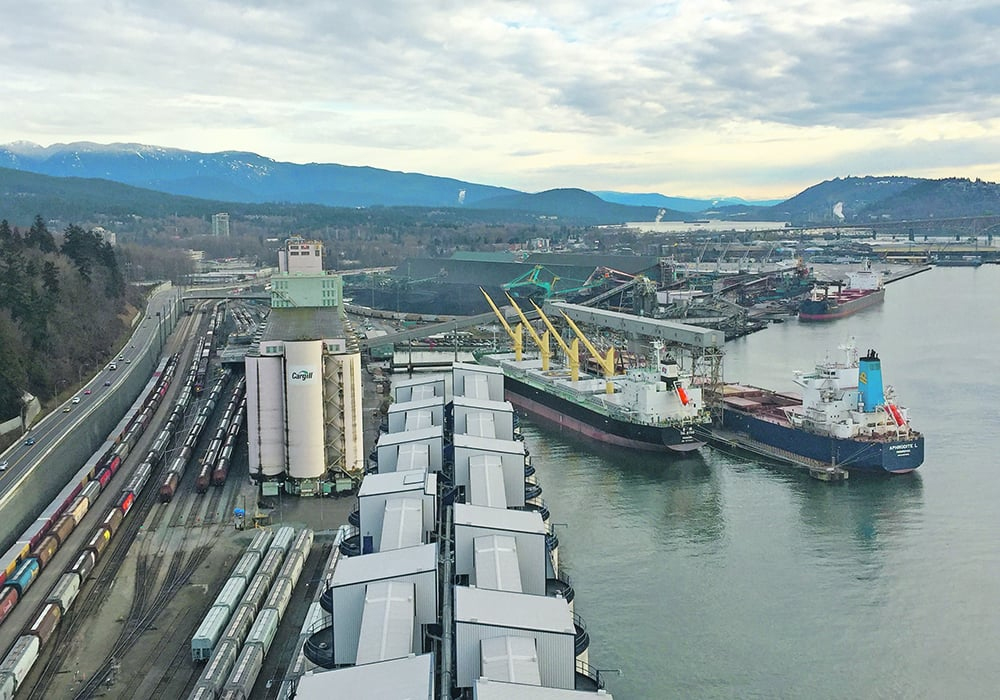The federal government wants to address the decades-old problem of rain delays and their costly impact on west coast ship-loading operations for grain vessels.
Last year, Ottawa established a working group on west coast ship-loading comprising grain companies, terminal operators, stevedoring organizations, labour union representatives, port authorities and government officials.
The group was established to look for ways to minimize the impact that rain can have on grain-loading operations at port.
The group held its first meeting in January and plans to continue to discuss potential solutions throughout the coming year.
Read Also

Canola oil transloading facility opens
DP World just opened its new canola oil transload facility at the Port of Vancouver. It can ship one million tonnes of the commodity per year.
“The group will bring forth ideas around potential solutions to facilitate safe loading of grain during inclement weather,” Transport Canada confirmed in a March 24 email to The Western Producer.
“These changes will address any hazards that may exist to safety and will also minimize the impact of operational disruptions on supply chains.”
Rain delays have been a persistent irritant for Canada’s commercial grain-handling industry.
Rain and wet conditions on the decks of grain ships can cause unsafe working conditions for crews. Heavy rains can also cause grain quality issues if enough rain falls into the holds of waiting vessels.
Decisions to halt loading operations can involve several stakeholders, including terminal operators, labour unions and ship captains.
The impact of rain on ship-loading operations has been greater than usual in the 2022-23 crop year, said Mark Hemmes, whose company manages the federal Grain Monitoring Program.
“This (crop) year, we’ve had two long periods of time where it rained and rained constantly for about five or six days, and it happened in November and December, right in the middle of the peak shipping period,” Hemmes said.
“We’ve never seen a year, in all the time we’ve been monitoring grain movement, where we’ve (had) this much rain in successive periods of time. This has been an anomaly.”
Vancouver has a reputation for rainy weather, but it’s uncommon and costly to have ship-loading operations shut down continuously for five or six days in a row, Hemmes said.
Industry sources who spoke with The Western Producer last week said prolonged interruptions to ship-loading operations resulted in some west coast grain export terminals reaching full capacity in late 2022 or early 2023.
With no more room for incoming grain, rail car unloading operations at west coast terminals were temporarily backed up and rail movements to and from west coast terminals were disrupted, prompting federally regulated railway companies to voice their concerns with Ottawa.
The first major weather-related delay occurred in October 2022, around the same time Ottawa was preparing to publish a report by a federally appointed National Supply Chain Task Force.
The task force was charged with examining the issues affecting the reliability and efficiency of Canada’s supply chain during and after the COVID-19 pandemic.
In its final report, released in October 2022, the task force suggested that Canada’s supply chain was nearing a “breaking point” and urged immediate action from government and industry.
Transport Canada said members of the grain loading round table will consider short- and long-term solutions that minimize the impact of rain.
“The working group has collectively agreed on reviewing four streams of work on loading grain in the rain, including jurisdictional and international case studies, new technology and innovations, science behind moisture sensitive loading operations and overall supply chain efficiency optimization and terminal specific requirements,” wrote Hicham Ayoun, senior communications adviser at Transport Canada.
“The group also committed to develop and define a process for evaluating innovative approaches and adhering to common principles that safeguard safety and efficiency.”
Transport Canada has also convened a second working group to look at the management of west coast vessel anchorages to reduce the number grain vessels at anchor and reduce overall wait times in port.


















